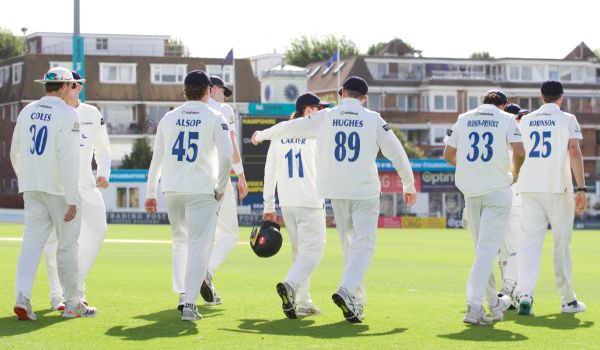Twirling away beneath the radar is Danny Briggs, the T20 Blast's all-time leading wicket-taker
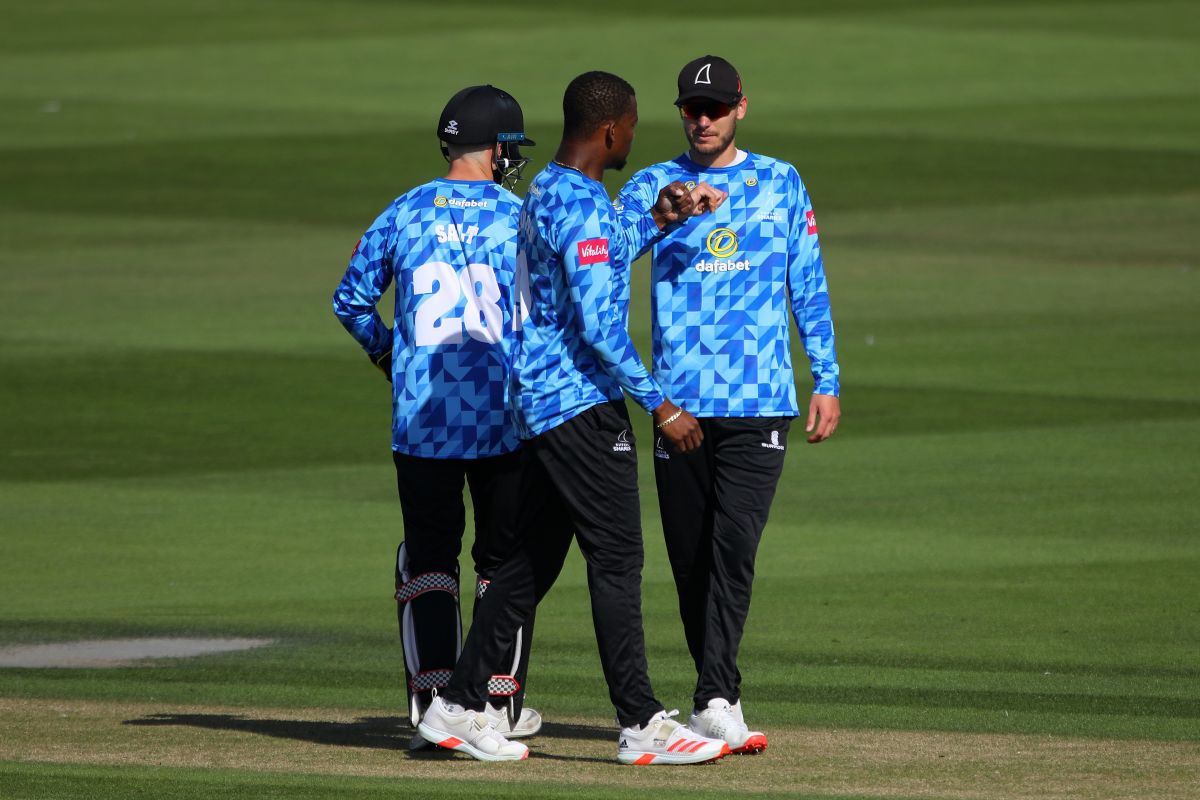
By Nick Friend for The Cricketer
Still only 29 years of age, Briggs has packed a lot into a career now into its second decade. He remains the most potent force in the T20 Blast; and yet, for all his credentials, he has never been picked up in a franchise tournament.
Danny Briggs made his international debut for England on the occasion of one of Kevin Pietersen’s finest hours.
Faced with an ODI chase against Pakistan in Dubai, he made 130 in a target of 238, surrounded by a batting line-up that included Alastair Cook, Jonathan Trott, Eoin Morgan and Jos Buttler – a collision of two white-ball eras.
For Pakistan, Junaid Khan was the solitary seamer, picked on a slow, challenging surface – the kind on which England often struggled – alongside Shahid Afridi, Saeed Ajmal, Abdur Rehman and Mohammad Hafeez.
That was eight years ago, and a lot has happened since – not least in the careers of those listed above. But for Briggs, who was 20 years old at the time and ended that day with figures of 2 for 39 from 10 overs, that – to this point – is the extent of his 50-over existence in England colours.
There have been seven appearances in T20Is – all within a two-year span between 2012 and 2014 that included the World T20 in Sri Lanka, but otherwise his career has been spent on the county circuit, first with Hampshire and latterly with Sussex, where he holds an exceptional, unrivalled record as a white-ball spinner.
Indeed, no one in T20 Blast history has taken as many wickets. He is out on his own: 172 in 147 matches; Samit Patel is his nearest rival, but 15 behind and six years older, nearing the twilight of his career as Briggs approaches his midpoint. Then come Yasir Arafat and Azhar Mahmood – high-class international cricketers both long since retired, with Harry Gurney – a globally renowned death bowler – next on the list.
For Briggs, it is a fine, underplayed feat – in tune with the bowler he has become; he only played his first T20 game in 2010, in the tournament’s eighth year. Of the twenty highest wicket-takers since the competition began in 2003, only Alfonso Thomas and Arafat have averaged more wickets per innings. Gloucestershire seamer David Payne is the only other man with over 100 Blast wickets under the age of 30.
“It gives me confidence, I think, to know that I’ve obviously done well for a long time, which then means that I’m consistent in that format,” he tells The Cricketer. “And that is a really good thing to know.
“It gets talked about a little bit, but for me it’s about trying to contribute as much as I can and win games for Sussex and win as many as we can. If I do that, then wickets will come. It’s not a case of trying to get as many wickets as you can in every game because you want to keep your record.
“It’s still about doing the right thing at the right time for the team. As a result, you’ll pick up wickets anyway.”
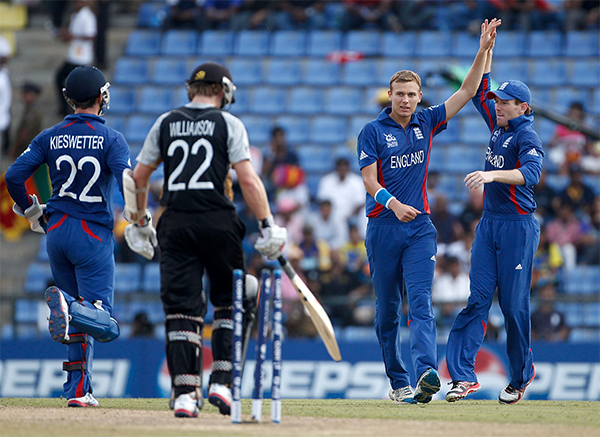
Briggs represented England at the 2012 World T20
By his own admission, there is little mystery to Briggs’ art. He has made a name for himself through a combination of nagging guile and wily consistency rather than an expansive repertoire of tricks.
“It keeps training fun when you’re trying to develop little knuckle-balls or a ball that you flick through your fingers,” he adds. “I’ve probably bowled balls like that for three or four years in a net but never committed to it in a game yet.
“If I needed to and I could 100 per cent rely on it, then maybe I would. But when I’m at my best, I’m thinking better and I feel one step ahead almost.
“And that’s almost where I need to be to succeed – if I can be a step ahead of the batter and if I can bowl the right ball at the right time, you won’t go far wrong. If you break that down to 24 balls per game, it’s just trying to make the right decision a few times and then you can hopefully be successful.
“Most of the time, I’d back my thinking and the execution of plans to outweigh the idea of bowling something different. But bowlers are always going to look for ways to try and improve.
“It’s just trying to know when the right time is to introduce something new and if it’s worth it. There are all sorts going through your head about whether you should or not; for me, I think my strength is in keeping the game fairly simple and trying to read it as best I can.”
As a quality, the simplicity of his skillset has helped him in the county game but, by the same token, might have restricted his ambitions further afield. Of the spinners thriving on the global T20 carousel, the vast majority have a more glamorous point of difference – able to turn the ball both ways or with an unusual action that encourages deception.
Meanwhile, in Briggs’ ESPNcricinfo profile, he is described as “a skilful, sublte purveyor of slow left-arm darts”. That is a compliment, but it also points to the kind of understated role rarely picked up as an overseas recruit.
It feels somewhat surprising that he has never featured on the franchise circuit despite entering multiple drafts in recent years, nor has he represented England for six years. It marks him out as a rare case, given his success at domestic level. Even in last year’s draft for The Hundred, he was only signed up by Welsh Fire in the penultimate round of picks at the £30,000 base price.
He agrees that his art is “probably not as attractive as other people’s jobs”, especially in a Sussex side full of big names. Ravi Bopara, Luke Wright, Tymal Mills, David Wiese, George Garton, Jofra Archer, Chris Jordan and Phil Salt have all played in franchise tournaments across the world and enjoy more stylish remits than Briggs, whose principal role has been as a frugal scourge through the middle overs.
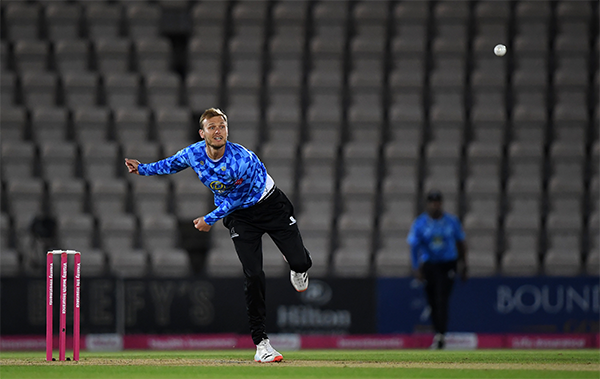
The Sussex spinner has taken more wickets than anyone in T20 Blast history
Perhaps, in spite of his numbers and their unquestionable value, he has rarely been able to stand out – after all, the quieter he goes about his work, the more effective it has been.
“I’d love to play franchise cricket,” he says. “I think it would be a great step for me to try to pit myself against different players from different countries, and almost bridge the gap between international cricket and try to get into big comps.
“I think it’s hard as a spinner – particularly from England. A lot of the competitions are in the subcontinent and they have a lot of spinners homegrown anyway, so in effect there are probably fewer spots, but I’d snap up any chance of trying to get a franchise gig anywhere just to test myself against different teams in a different country.”
A Daily Mail report earlier this week suggested that Briggs might be under consideration from Big Bash sides ahead of the upcoming edition of the competition. “It would be brilliant to play out there,” he admits.
Sussex, of course, have been well represented in the tournament, with Jason Gillespie as Adelaide Strikers head coach and a connection that links Rashid Khan, Phil Salt, Alex Carey, Jordan and Travis Head. Further afield, Mills, Archer and Wright have all enjoyed associations of varying lengths with Hobart Hurricanes and Melbourne Stars.
However, even if an offer is not forthcoming, Briggs speaks as a cricketer content with his lot, focused on success at county level, determined to claim silverware in Gillespie’s final campaign in charge. He adds that he rarely thinks of the prospect of an England recall. “I suppose that’s because I don’t really feel that close to it, I imagine,” he considers.
“I want to win a trophy with Sussex. That’s why I think everyone is so driven and wants to get through the group. Ultimately, we want to win.
“The England thing hasn’t really come into it for me; obviously, I’d absolutely love to but they’ve got such a strong squad at the minute that I think it’s off quite a lot of people’s radar. All I can do is try to win things with Sussex and go from there.”
He has been an ever-present member of Sussex’s Blast side this season, having sat out during the Bob Willis Trophy, where Irish teenager Jack Carson impressed with his off-spin. Only two men have taken more wickets in this year’s competition; and typically, his economy rate of 6.54 is the third-most miserly of any of the 20 highest wicket-takers.
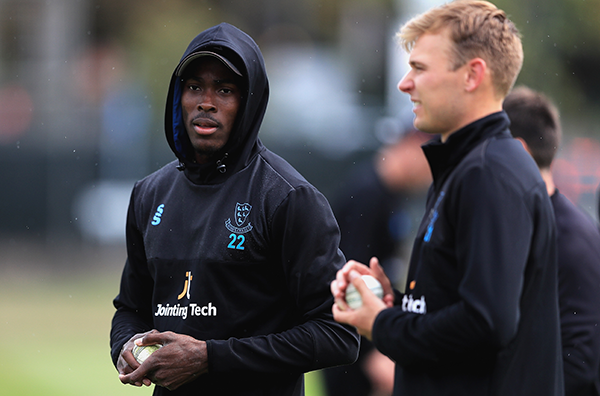
Briggs plays in a Sussex T20 side full of big names, Jofra Archer among them
Remarkably, only twice in the last decade has he conceded his runs across a Blast campaign at an economy rate higher than 7.40 – a telling statistic that resonates with this next figure: only two men – Patel and Gareth Batty – have bowled more balls in the history of England’s domestic T20 tournament. For a man still short of his 30th birthday, it is a remarkable record.
“I think with T20, spinners are seen as survivors,” he reflects. “But I think if you’re trying to survive in a positive way, you can actually hold the game and try to go at a low rate and try to pick up wickets through doing the same thing.
“T20 is such a game of urgency for the batters at times that you can attack while having a fairly defensive field at the same time. It’s just trying to stick to your strengths.
“Batters change a lot. You bowl to the same bloke one year to another – they can have learnt a new shot or have a slightly different game plan. You have to think on your feet out there, as well as preparing for what they might do.”
He looks back to his brief sojourn in the international arena – a brutal learning curve for any young finger-spinner – and how far he has come since then. Once upon a time, he became the youngest English spinner to reach 100 first-class wickets since Derek Underwood.
“I suppose when I started, I was fairly clueless, to be honest,” he muses. “You go and bowl and just do what you’ve done growing up as a youngster. I think now there’s a lot more thought that goes behind it – whether it’s working out batters or working out what your best ball is at a certain point in the game.
“I’d say that comes with experience; I’d say I’m obviously a better bowler now, but the basic fundamentals of my game have always been there.”
He was dealt a cruel hand with England. His final T20I came in a high-scoring defeat in Hobart, where his four overs cost 53 runs. Two games earlier, Aaron Finch had plundered an unbeaten 156, feasting on everyone – and Briggs was neither exempt nor alone. Looking back, though, he knows the experience and years since can only have helped him.
“It can be hard work on small grounds, flat wickets and whatever it may be,” he explains. “But in the long run, I think it stands you in good stead. It has to make you a better bowler for exposing yourself in those conditions, and you have to learn and work out different ways of being effective on different surfaces.
“I think it probably does make you better and also accept sometimes that you might get hit. But that’s the game for a spinner. He might also hit it straight up and you might get a wicket on another day.
“For me, as long as you’ve committed to what you’re going to bowl and you’ve tried to execute that, then you can’t do any more and you have to accept that.”
That belief has served him well so far. And still only 29 years of age, there is plenty left in the tank – not to mention a record to extend, even if he does so from beneath the radar.
For unrivalled coverage of the county season, subscribe to The Cricketer and receive 3 issues for £5



